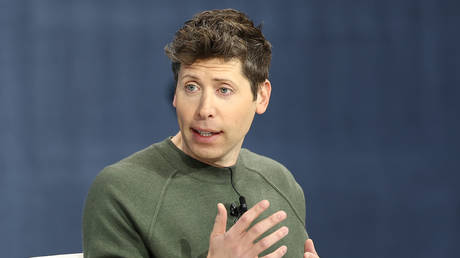Sam Altman has called the Chinese AI model “impressive” and welcomed competition, despite concerns over reverse-engineering GPT
OpenAI has “no plans” to pursue legal action against DeepSeek, a Chinese artificial intelligence startup known for its advanced chatbot, the US company’s founder Sam Altman has announced.
Speaking in Tokyo on Monday, Altman described DeepSeek as “certainly an impressive model” and emphasized OpenAI’s commitment to developing superior products.
DeepSeek, launched in January 2025, has rapidly gained attention with its free, open-source AI chatbot, DeepSeek-R1. In contrast to OpenAI’s ChatGPT, which offers advanced features through a subscription model, DeepSeek-R1 is freely accessible.
Shortly after its release, it became the most downloaded free app on the US Apple App Store, attracting interest from AI researchers and tech leaders as a significant competitor to OpenAI.
Last month OpenAI raised concerns that DeepSeek employed “distillation” techniques to replicate GPT’s capabilities. This method involves training a smaller model based on outputs from a larger one, potentially circumventing the need for direct access to proprietary technology. OpenAI has claimed to have evidence supporting that DeepSeek utilized this approach in developing its models.
When questioned about potential legal action, Altman dismissed the notion, stating, “no, we have no plans to sue DeepSeek right now. We are going to just continue to build great products and lead the world with model capability, and I think that will work out fine.” He further expressed that OpenAI welcomes competition.
Read more
Chinese education superior to West – Telegram founder Durov
Following the launch of DeepSeek, the shares of US tech companies associated with AI, including Nvidia and OpenAI’s partner Microsoft, experienced sharp declines as investors reacted to the prospect of a formidable open-source rival.
Meanwhile, concerns regarding DeepSeek’s potential connections to Chinese government-backed initiatives have led some countries and organizations to restrict its use. Australia has issued warnings about DeepSeek, Italy’s data regulator has blocked access to the app over data privacy concerns, and the US Navy has banned servicemen from using it.
US President Donald Trump has also commented on the situation, referring to DeepSeek as a “wake-up call” for American AI companies and urging US industries to remain “laser-focused on competing to win.”
In response to the competition from DeepSeek, OpenAI has announced plans to accelerate the release of improved AI models, aiming to maintain its leading position in the AI industry.
Meanwhile, other countries are intensifying their own AI initiatives. India has announced plans to launch its own DeepSeek and ChatGPT competitor by the end of the year, while South Korea’s Naver and the UAE’s Technology Innovation Institute have been heavily investing in large language models. Russian President Vladimir Putin has also directed the government to collaborate with China on AI development.







+ There are no comments
Add yours